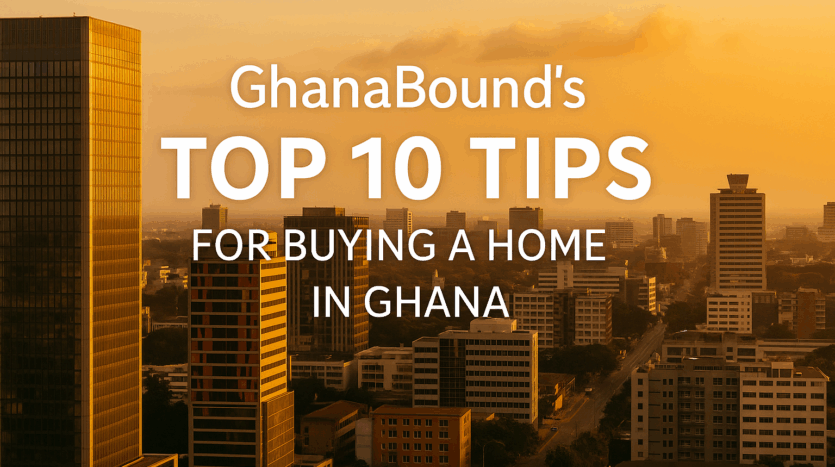GhanaBound’s Top 10 Tips for Buying a Home in Ghana
Thinking about buying a home or investing in property in Ghana? This concise, practical guide from GhanaBound covers the 10 essentials—from legal checks to financing and professional representation—so you can invest with confidence.
Tip 1 — Start with Legal Clarity
Before you fall in love with any plot or house, verify ownership and title registration with the Lands Commission. Request a formal search report and ensure the site plan aligns with what is on the ground. A property lawyer or trusted agent can help you run these checks and confirm there are no competing claims or encumbrances.
Tip 2 — Know Your Land Tenure System
Ghana primarily operates under customary tenure. Understand which category you’re dealing with and what it means for your rights and obligations:
- Stool (Traditional) Land — Administered by chiefs/elders; typically leased (often 50–99 years).
- Family Land — Held by families; sales/leases require consent from recognized family heads.
- Government/Vested Land — Managed by the state or Lands Commission for public or development use.
- Private Freehold — Rare; usually historic holdings. Confirm details and limitations carefully.
Always ensure your transaction is supported by a valid indenture/lease and reflected at the Lands Commission.
Tip 3 — Work with Reputable Developers
Developer credibility can make or break your investment. Review completed projects, delivery timelines, and documentation (building permit, site plan, completion certificate). A reputable developer provides:
- Transparency — Clear contracts, documented payment plans, and proof of title.
- Quality Assurance — Durable materials, proper supervision, and code compliance.
- After-sales Support — Snagging, warranties, and maintenance guidance.
Tip 4 — Consider Location Beyond Today’s Trend
Prime areas like Cantonments, Airport Residential Area, and East Legon remain desirable, but smart buyers also look at growth corridors such as Oyarifa, Ayi Mensah, Oyibi, Sakumono, and Appolonia. Assess current value and future upside.
- Accessibility — Proximity to major roads and commute routes.
- Amenities — Schools, healthcare, and shopping nearby or planned.
- Future Infrastructure — Upcoming highways, flyovers, utilities, or business hubs.
- Rental Demand — Suitability for returnees, professionals, or short-lets.
Tip 5 — Budget for Hidden Costs
In addition to the purchase price, plan for:
- Stamp duty (typically 1–3%).
- Legal fees and registration costs.
- Agency commissions (where applicable).
- Survey/valuation, utility connection, and service charges for estates.
Budgeting early prevents delays and stress later.
Tip 6 — Check Access to Utilities
Confirm reliable access to water, electricity, and roads before you commit—especially in fast-growing areas outside Accra.
- Is the area connected to Ghana Water Company Limited (GWCL) and the Electricity Company of Ghana (ECG) grids?
- Are there boreholes, backup water storage, solar, or inverter systems?
- How reliable is road access during the rainy season?
- Are there any outstanding utility bills tied to the property? (Some buyers have been forced to clear arrears left by previous owners/tenants.)
Tip 7 — Plan for Future Value
Look at what’s coming tomorrow, not just what exists today. Ask your agent about planned projects within 10 km: new highways, malls, estates, schools, or rezoning. Buying ahead of major improvements often yields long-term equity and stronger rental potential.
Tip 8 — Understand Diaspora Financing Options
Developers and banks increasingly offer diaspora-friendly mortgages and payment plans for buyers overseas. Work only with reputable institutions that understand cross-border processes.
- Payment timelines in USD, GBP, or EUR.
- Developer-backed plans (often 0–7 years).
- Diaspora mortgage facilities via Ghanaian banks or global partners.
Important: Payments from abroad are often converted directly into Ghana cedis (GHS), as paying for property in foreign currency within Ghana is prohibited by law. Ensure your agreement clearly states conversion rates and local settlement terms.
Tip 9 — Visit Before You Buy
No online photo or video can replace viewing a property in person. Whenever possible, schedule an in-person visit before making final payment or signing.
- Walk the development yourself and assess finishes.
- Explore access roads and nearby amenities.
- Meet developers or agents face-to-face to discuss plans.
If you’re visiting during December in Ghana, combine your trip with private viewings.
Tip 10 — Work with Licensed Professionals
Avoid informal “middlemen.” Engage licensed real-estate agents, surveyors, and lawyers who provide verified documentation and protect your interests.
- Ghana Real Estate Agency Council (GREC) registration/license details.
- Official business documents (company registration, tax ID).
- Written agreements and numbered receipts for every transaction.
Professional representation ensures transparency, legal protection, and accountability—and helps prevent fraud, double sales, and ownership disputes.
Book a Consultation or Viewing
GhanaBound helps diaspora and local buyers secure the right property—safely, transparently, and efficiently. To plan a consultation or schedule private viewings, contact us below.
GhanaBound Real Estate
www.ghanabound.com
sam@ghanabound.com | +233 264 589 247
Note: This guide provides general information and is not legal advice. Always consult a qualified professional for your specific transaction.


